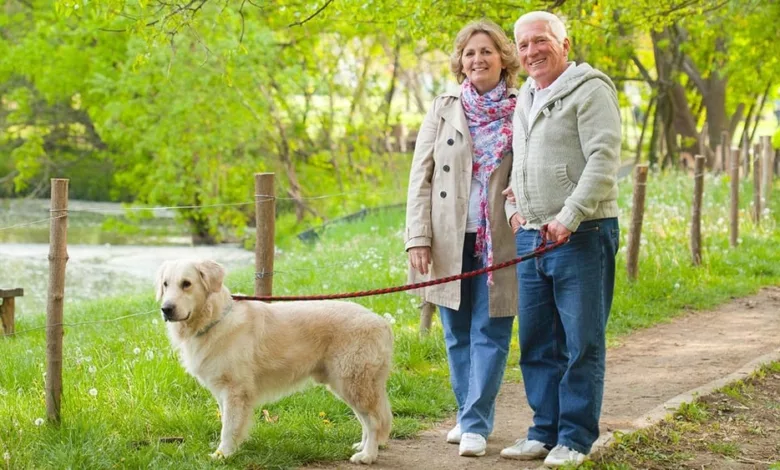Conflicted About Getting a Pet Because You Think You’re Too Old?

Story at-a-Glance
- Pet ownership offers many physical and emotional benefits for seniors, although practical matters, such as health status, must be considered
- In a study of older adults, dog walking was associated with lower body mass index, fewer doctor visits, fewer limitations to daily living and more frequent moderate and vigorous exercise
- Caring for an aging animal can take an emotional toll; in one survey of pet owners, there was greater burden, stress and symptoms of depression and anxiety, as well as poorer quality of life, in owners of pets with chronic or terminal disease.
Baby boomers represent about 37 percent of all pet owners,1 but there’s some debate over whether pet ownership is beneficial or burdensome during your golden years. If you’re in good health, financially stable and looking to add more unconditional love and companionship to your life, then there’s good reason to open your home to a pet.
However, practically speaking, if your health is failing you’ll have difficulty with the day-to-day care that pet ownership requires; this is true regardless of age, particularly if you have no one to help you out. Before we get into the potential pitfalls, however, let’s take a look at how owning a pet stands to benefit you as you age.
Owning a Pet is Good for Your Health
Walking is great for your health, including when you’re older, and having a dog is a great impetus for getting out there and walking. In fact, in a study of older adults, dog walking was associated with lower body mass index, fewer doctor visits, fewer limitations to daily living and more frequent moderate and vigorous exercise.2 “The relationship with one’s dog may be a positive influence on physical activity for older adults,” the researchers concluded, and they weren’t the first to do so.
In the study of 1,570 peopled aged 60 years or over, owning a dog was associated with a 3.34 mmHg decrease in systolic blood pressure.
Dr. Ragavendra Baliga, a cardiologist and professor of internal medicine at Ohio State University’s Wexner Medical Center, told The Columbus Dispatch, “To put that into perspective, even a 2 mm reduction in systolic blood pressure is associated with a 6 percent reduction in stroke, a 4 percent reduction in coronary heart disease and a 3 percent reduction in overall mortality.”3
The U.S. Centers for Disease Control and Prevention (CDC) also states that pets can decrease your blood pressure and triglyceride levels,4 while the American Heart Association has stated that pets may help reduce your risk of heart disease. Pets’ benefits to health extend beyond the physical into the emotional realm as well.
One of the greatest benefits is that pets help you stay focused on the present moment, providing a focal point for your attention and helping to provide a routine to your day, something that many miss following retirement. They can also help you overcome loneliness and act as social icebreakers, facilitating new friendships.
Caring for Aging Pets Can Be Emotionally and Physically Taxing
 Pets age faster than people, so it’s important to be realistic regarding the demands of pet ownership as both you and your pet age.
Pets age faster than people, so it’s important to be realistic regarding the demands of pet ownership as both you and your pet age.
When pets get older, they may have trouble seeing or hearing, or they may require help going up and down stairs. If you’re having trouble with balance, frailty or are fearful of falling yourself, it will be difficult for you to physically care for a dog (particularly a larger dog) that is having his own mobility issues.
Caring for an aging animal can take an emotional toll as well. In a survey of 600 pet owners, there was greater burden, stress and symptoms of depression and anxiety, as well as poorer quality of life, in owners of pets with chronic or terminal disease.5 However, this was true regardless of age, and while it’s difficult to face end-of-life issues with your pet, most pet owners would agree that it’s a sacrifice they’ll gladly make in exchange for the years of happiness their pet created.
It’s important to put a plan into place to provide care for your pet in the event you become unable to, however understand that providing appropriate environmental enrichment for older dogs can stave off some of the cognitive dysfunction that sometimes occurs with age.6 Examples include:7
- Provide food toys and puzzles for mental stimulation
- Hide bits of food outdoors so your pet can search for them
- Take your dog on walks to provide physical exercise and a new sensory experience
- Provide a safe space for cats to spend time outdoors and provide a vertical space indoors to encourage activity
- Teach your dog new tricks and encourage active playtime; if your dog needs a bit of a push in his learning, positive reinforcement behavior training — involving lots of healthy treats and praise — can also work wonders in teaching your senior dog some new (or old) tricks
Some Shelters Specialize in Matching Older Pets With Older Humans
As long as your health, finances and living situation allow it, the benefits of pet ownership tend to far outweigh the cons, including if you’re older. It’s worth noting that some senior centers and retirement communities are also acknowledging this and allow residents to move in with pets.
Many animal shelters also allow seniors to adopt pets at a reduced cost, and some also have “seniors for seniors” programs that specialize in matching older animals with older humans. One such program exists at Helping Paws Animal Shelter in Woodstock, Illinois, which states:
“Our Senior to Senior adoption program is all about senior citizens rediscovering the joys of having a cat or dog in their lives. The program helps place senior cats and dogs, who are 7 years of age and older, with senior citizens who are 65 years of age or older. The adoption fee is waived for any approved senior citizen adopting a senior pet.”8
If you’d love to have a pet in your life but feel the commitment of pet ownership may be overwhelming, keep in mind that there are options for this as well, such as fostering an animal, visiting with a therapy animal or volunteering to walk a neighbor’s dog or help out at an animal shelter. If you love animals, spending time in their presence, even temporarily, is likely to offer many of the same benefits of pet ownership without as much responsibility — and this is something you can take advantage of at any age.





